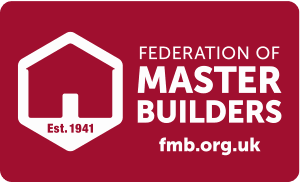If you own a factory or warehouse, or any kind of large-scale business, industrial floor cleaning should be something that you are aware of and are actively pursuing. It is essential for health and safety and is something that should be a part of every business' regular cleaning routine.
Floor cleaning is essential for keeping businesses running smoothly, saving money, and keeping employees and products safe. It can be done by hand, but it is usually done using appropriate cleaning equipment like a floor cleaning machine.
Buying that equipment, though, can be a big investment. Floor cleaning equipment is a big purchase, and for many starting businesses and even those further along in their development, it is simply easier to hire industrial floor cleaning services like the service we offer at NW Wash than to purchase floor cleaning equipment.
For anyone unsure what they need to do to keep their industrial floors clean, what equipment they should be buying, or what the alternative options are - here is everything you need to know about industrial floor cleaning.

So what is classed as appropriate cleaning equipment for industrial floors?
If you thought a mop, broom, and vacuum cleaner would be enough, then you might be spending way more time cleaning than you need to be! There are specially designed machines and tools for industrial floor cleaning.
There are a few different types of industrial floor cleaning machines that work perfectly to get dirty industrial floors clean. If you're looking to get your workplace clean, you may want to invest in either of these popular machines:
An industrial scrubber dryer uses water and cleaning chemicals to wash the floor as it moves. It then dries the floors too. It is a great tool for floor cleaning and can remove dirt and grime from the surface of the floor with ease.
Usually, scrubber dryers are battery-operated. They can either ride on or walk behind, depending on the size and make of the model.
Floor scrubber dryers can remove stubborn dirt, oil spills, chewing gum, dirty footprints, and even tyre marks.

Floor sweepers are kind of like industrial vacuum cleaners. They have rotating brushes and work as a large floor sweeper, picking up debris as they're moved around the warehouses and factories.
Just like the scrubber driers, these are usually battery-powered but can be ridden on or walked behind.
Floor sweepers can pick up any dirt and debris on the floor's surface, making it much safer for staff and customers. They make industrial cleaning much easier.

These machines, unfortunately, are not cheap. Industrial floor cleaning machines are usually considered to be an investment, as you will typically get a warranty with them and at least five years of action from each industrial floor cleaning machine.
Each floor cleaning machine will cost at least £2,000. As with any product, various factors will influence this price, including which brand and model you get. One of the most popular cleaning tools out there is the Factory Cat, but there are hundreds of brands that offer tools that will do a great job at meeting all of the necessary health and safety requirements and allow you to keep your floor surfaces nice and clean with minimal effort.
Whichever product you invest in, you'll find that they soon make up for their price. Scrubber dryers and sweepers are great products that clean incredibly efficiently. There's a reason the specialist equipment is so pricey!
Alternatively, you may choose to hire industrial floor cleaning services. A team of professionals who will know the floor cleaning machines inside out and how to provide you with a proper clean.
If you're interested in saving money when it comes to industrial floor cleaning costs, then hiring a team to do your industrial floor cleaning is the way forward. Contact NW Wash today for a free quote.

In addition to industrial floor cleaning machines, there are also commercial floor cleaning machines. These are slightly different, even though they serve similar purposes.
Commercial floor cleaning machines are usually slightly smaller, corded, and typically don't come with ride-on options. They are cheaper and are designed for smaller workplaces where a mop and bucket would be inefficient to tackle dirty floors, but industrial floor cleaning machines would be a little overkill.
Trying to determine which is the right machine for your business can be difficult. The best way to decide is to figure out exactly what your floor cleaning needs. It should suit the efficiency, size, and productivity of your business.
With industrial floor cleaning machines and industrial floor cleaning services costing the business, you might find yourself wondering why cleaning industrial floors is important.
There are a number of reasons that industrial floor cleaning is essential.
Check out: How To Clean External Cladding
By removing dirt buildup and oil spills, you can prevent slip and trip hazards in your workplace. This will dramatically reduce injuries and could potentially save your business from suffering a lawsuit.
In some cases, failing to remove dirt from warehouses and distribution centres can lead to fires. This is because dust can build up on machinery, causing it to overheat much quicker than normal.
Do you have stakeholders visit your factory floors? Or new potential employees and stockists? Then you'll want to remove dirt and grime to provide the best possible impression of your business.

Technically, you could clean a factory without industrial floor cleaning machines or commercial floor cleaning machines. It is not impossible, by any stretch of the imagination. However, it would take a cleaning team a significant amount of time to be able to ensure that every inch of the factory floors were completely clean.
Using industrial floor cleaning machines is simply quicker and much more effective than using simple vacuum cleaners and a mop and bucket. You will also find that it involves less manpower, allowing your cleaning team to clean the whole premise much faster than if they were cleaning the industrial floors by hand.
In addition to all of that, most popular machines will come with warranties, meaning that if they break you are able to get them fixed or get a replacement. This is more than can be said for a mop or an old vacuum!
There is also an element of sustainability to the industrial floor cleaning machine. Most of them use minimal water and fewer chemicals than cleaning the factory by hand would involve. As a result, they are often considered to be cost-effective.

Spending that much on industrial floor cleaning machinery can feel ridiculous, especially if you've not seen how well they work. But industrial floor cleaning is essential, whether you have your own machinery or not.
If you're not quite ready to take the plunge and invest in all the right machinery just yet, but you know you want to protect your business, your employees, and your warehouse, then why not consider floor cleaning services?
Our team at NW Wash will use our own gear to get your floor sparkling clean. You won't have to invest in any floor cleaning equipment, and you'll still get all the benefits of industrial floor sweepers and scrubber dryers!
Does that sound like a better deal than just trying to clean your floor with normal vacuum cleaners and a mop bucket? Then contact NW Wash today for a free no obligation quote!
In order to properly pressure wash your driveway, the following gear is essential.
Discover more: Why Pressure Wash Your Driveway
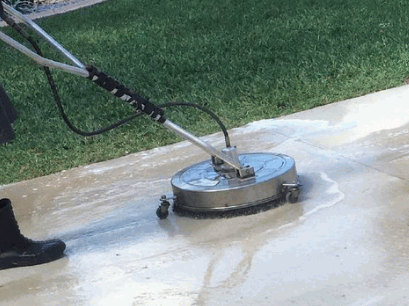
First of all, you need to ensure that you're not going to damage anything else. This means removing plant pots from your driveway, putting any hanging laundry away if it's laundry day, removing furniture, and vehicles, and sweeping any debris off of the surface.
The jet stream from the pressure washer hose can cause debris to fly up and hit windows and doors, so these should be protected. Using painter's tape and garbage bags or a tarp, you can cover windows and doors to protect them from dirt and debris.
Look at your pressure washer's manufacturing instructions and assemble and prepare as necessary. Every pressure washer is different, so it is crucial that you follow directions.

Put on your safety gear. This should include safety glasses or safety goggles, headphones or hearing protectors, and an outfit that is fine to get wet. Steel-cap shoes are also wise as a pressure washer has significant cleaning power and can do a lot of damage.

If you wish to use a detergent to tackle stains or organic growth, apply this now. Alternatively, you may want to use a broom to scrub the surface. Either way, it will help to remove grime from the surface, making washing and removing any stains significantly easier during the cleaning job.

You can now begin to pressure wash. Work side to side with each movement overlapping the last by about a foot. Keep the nozzle at a 45-degree angle from the floor and be sure to check what distance the instructions recommend you keep at. You want to wash the entire driveway, even the joints between stones or bricks, in order to have a clean surface.
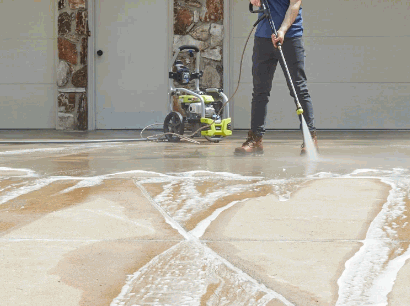
Rinsing the surface removes dirty water, allowing you to remove any dirt or grime completely. Be sure to stop dirty water from running into the drains as this may lead to a fine.
Once rinsed, leave the ground to dry and then you may wish to use a sealant.
Explore in-depth: How Much Does Driveway Pressure Washing Cost
Remember that pressure washing is dangerous. Pressure washers are not toys and can cause serious damage, even when driveway cleaning. They can be detrimental to the surface of your driveway, and your home, and can cause physical injury.
If you do not have a pressure washer, you've never used one, or you're unsure you have the skill to pressure wash a driveway - contact professionals. Our team at NW Wash will be able to help you get your driveway clean in no time at all, without any of the risks of doing it yourself.
Exterior cladding has a huge range of benefits. It can really make a world of difference in both residential and commercial buildings, but in order to do so, it has to be well maintained.
One essential task when it comes to maintaining cladding is to clean cladding regularly. By sticking to a regular cladding cleaning schedule and removing surface dirt, we can ensure that we get the most out of our cladding.
Many people, however, find the cladding cleaning process daunting. That's where NW Wash comes in. As a professional cleaning company, we can make your exterior cladding look brand new.
If your cladding needs some TLC and you're not sure where to begin, here's everything you need to know about cladding cleaning. Remember - if in doubt, hire professionals like the NW Wash team!

Cladding sits on the outside of our buildings, which often leads to people wondering why they should bother to clean it. After all, surely it's designed to be used outside?
While this is true, it is still crucial to clean cladding for a multitude of reasons. For example:
Cladding is one of the first things that people see when they visit a property. It can make or break their first thoughts on the property, and, in the case of large commercial properties, it can really help gain potential customers' trust. By maintaining your cladding, you can ensure that your building looks just as good as the services you offer.
Giving the right impression is half the job when you're trying to sell or market a product or a service.
Cladding is a resistant material, and it can usually hold its own against most things. However, sometimes, cladding can get damaged. One way to ensure that you minimise the risk of damage to your cladding.
Things like mould, bird droppings, algae, and mildew can all wear away at cladding materials. This can cause long-term and irreparable damage. This can be costly to replace or repair, and is always best to catch early!
Explore: Does Pressure Washing Damage Roof Tiles
Since there is less on the cladding causing it damage, you will find that cleaning cladding actually prolongs the lifespan of it. This means you will get much more for your money if you do regular cladding maintenance.
A longer life is always a good thing when it comes to large investments like cladding!

A lot of cladding company warranties dictate that the cladding must be well taken care of. By that, they mean it must be cleaned on a regular basis. Failing to do so may mean that should you face any issues with your cladding, you may not be able to claim.
It is important to note that there are a few different types of cladding, and each type of cladding must be cleaned and handled in a different way because no two cladding materials are the same.
So if you intend to clean your cladding yourself, you must make sure you know exactly what kind of cladding material you've got before you start cleaning work. Likewise, when working with cleaning professionals, you should be sure to give as much information about your cladding as possible. Professional cleaning companies will know how to expertly handle each material in order to provide the best cleaning services.
You might have any of the following types of cladding:
Zinc cladding is often chosen because it is fire-resistant, insect-proof, and classed as a fungistat, meaning it is resistant to organic growth like fungi. It can last for a very long time if treated well and can look great on the side of large commercial buildings.

Easy and fast to install, PVC cladding provides companies with noticeable energy savings. It is a great thermal insulator and helps to reduce condensation within the property. As a result, it's a very popular choice.

Aluminium is another metal cladding material that is quite common. It's known for its UV resistance, easy installation, and waterproof qualities. Aluminium is considered to be a strong cladding material, but it is also very lightweight.

uPVC is weather-resistant and stylish, and it is usually a very cheap way to clad a building - making it very popular! It's considered to be stylish and low maintenance, so is becoming more and more common.
Other metal materials can be used to clad buildings. These are typically resilient and strong, fire resistant and often sustainable, and can give a commercial building a great look.
Another great option for thermal insulation, wood cladding can also help to provide sound insulation, too. It's incredibly durable as a cladding material and can be sourced sustainably.
When cleaning metal cladding, you should never use chemicals. These can damage the coating and the metal itself and could void the warranty. Avoid all cleaning products.

Zinc is easily discoloured by cleaning products, so it must be cleaned carefully. It is often recommended to hire a professional to clean Zinc so that you do not wash or damage the coating.
To clean Zinc cladding:
Wood cladding needs to be cleaned much more often than other materials, which is an important factor to consider when choosing cladding. It is prone to mould, so needs more regular cleaning.
The best cleaning method for timber is:
You can technically use a jet wash on timber cladding but it can strip away exterior coatings. This can then make the wood more susceptible to weather damage. If you want to jet wash your wood cladding, we recommend paying for a cleaning service to get the job done right. Jet washing can be risky, so if trying it yourself, always test it on a small and inconspicuous area first.
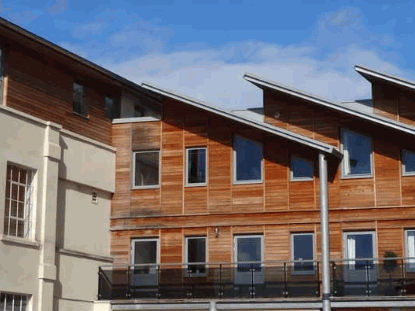
Concrete is a hardy material, which is why it is so common in building work. It's like a brick in that it is a material that can absolutely be relied upon.
To clean cladding made of concrete you should either use a sponge and soapy water, or you can get out the pressure washer and start jet washing! The material is hard enough to withstand the force. Just be careful when jet washing, as it is a dangerous activity - safety is important.
For stubborn dirt and stains, use acetic acid and patch-treat the concrete. For organic growth, you can use hydrogen peroxide to kill and remove it. It should also prevent organic growth from returning for a while, too.
Stone cladding does not have a protective coating, so can be safely pressure washed if you do it at the right angle, PSI, and distance. Always follow the safety guidelines when you clean your cladding. Alternatively, it can be cleaned with soapy water. You should be sure to take care when cleaning stone cladding, especially with material like natural sandstone.
Take a look: Can You Pressure Wash Indian Sandstone

While you definitely can clean cladding yourself, it is easier more often than not to hire professional cladding cleaning services for regular cleaning work. We can work safely and get your cleaning job done, we know how to clean each surface and have the skills and kit to do so (things like telescopic poles and pressure washers aren't always easy to buy or use!).
Our customers swear by our service because whether it's timber panels or concrete cladding, we'll have it clean in no time at all and back to its original colour! For your free quote, contact NW Wash today and ask about our cleaning cladding service.
Painted brick surfaces can look wonderful. But eventually, after a few years, it chips and wears, leaving a few flakes of leftover paint ruining the look of the otherwise stunning brickwork.
If your property has painted brick that either just isn't your taste anymore or that has started to fade and chip away, you'll have found yourself looking into the best ways to remove paint from brick. When looking, you might find that one of the most commonly suggested methods is pressure washing the paint off of the brick surfaces - but is that really a good idea?
At NW Wash we're experts in all things pressure washers and cleaning. Here's what you need to know about removing paint from brick.

In theory, you can remove paint from brick with a pressure washer. The pure force behind the stream of water from the power washer blasts the paint from the brick pretty effortlessly. This is why it's often quoted as one of the most effective methods of paint removal out there.
However, what many people don't consider, is that when you pressure wash a brick wall, you're likely to cause damage. Brick surfaces are resilient, they can hold a lot of weight and certain types of brick are resistant to heat and the weather, but ultimately, brick is a porous substance.
When you blast a porous substance with a high-pressure stream of water like that from a pressure washer, you're likely to create issues in one of two ways. You may find that the brick gets smashed up and broken by the pressurised water, leaving damaged and unattractive brick that may not be structurally sound. Alternatively, you may create cracks and holes on a smaller level. These may then allow water into the wall, causing rising dampness and moisture problems for the property.
Discover: Does Pressure Washing Damage Roof Tiles
Brick can be cleaned with a pressure washer, but it is advised that you call experts like NW Wash to come and do the job for you. Not only will professional painters and paint removers have the necessary tools and skill, but they will also be able to check a small area of your wall to see how it will hold up against the pressure washer before they start trying to remove stubborn paint.
Trying to remove paint from brick on your own using a pressure washer is dangerous. Not only could you harm your wall, but you could injure yourself. Pressure washers are not toys, and can cause serious injuries if used incorrectly.

There are a few other techniques that professionals like the team at NW Wash may use to remove paint from brick. Which technique we employ will often depend on the brick, the condition of the wall, and the condition of the remaining paint.
Find out more: Brick Cleaning
Paint stripper is an absolutely brilliant invention. Designed specifically for jobs like this, there are a number of different types of paint strippers out there that will work wonders to remove paint from brick.
It is important to make sure you have the right kind of paint stripper for your brick surface and to check that your bricks are in the right condition to have the remaining paint removed before you begin. Remember that paint strippers are often packed full of caustic chemicals (harsh chemicals that are able to corrode), so you should always be careful not to do more harm than good with the products.
When working on a vertical area, a gel paint stripper will always make the job a little bit easier.
When working with NW Wash, we have all of the skills and knowledge to ensure that only top-tier, safe products will be used on your wall. That way, we can be sure that you'll get the best finish possible.

To remove paint from brick using paint strippers, you will need:
Once all of your equipment has been gathered, you should:
Place drop cloths to cover the ground beneath the brick and remove any nearby furniture or plant pots to ensure that cleaning up after removing paint doesn't take you too long.
As with any cleaning, always do a patch test to ensure that the paint stripper does not discolor or damage the brick and to check it works. This should be done in a small, inconspicuous area.
These can often reveal what the paint was used to hide (i.e., damaged brick) and can put a halt to the process.
Loose paint that is flaking off the brick needs to be removed. You can scrape this away easily before you get your paint strippers out.
Following the manufacturer's instructions, apply the paint stripper to the target area. Usually, a tool will be provided to help you with this, but if not, a trowel will work well. Cover every single brick and push the substance into every hole and crevice. You may need multiple layers - check the instructions to find out how many layers they suggest.
You should place peeling strips over the paint stripper. These should overlap one another in order to make sure that you have covered every single brick. Push the strips firmly into the stripper chemicals.
The waiting period usually depends on the product. You should always check the bottle of paint stripper for instructions. In some cases, you may have to wait 24 hours.
You should remove the peeling strips after the necessary wait period. This needs to be done slowly to avoid tearing them. After the strips are removed, you may need to use a trowel to remove any leftover paint-stripping residue.
If the trowel doesn't work, you may need to try warm water and a stiff brush to remove any remaining paint or residue.
Sandblasting is another technique that can be used to remove paint from brick work. However, much like pressure washing, it can be a risk when it comes to maintaining the structural integrity of the brick work.
You should also check any brick work for asbestos and the paint for lead before you sandblast paint off brick, as both are toxic materials and can end up in the air when the paint is sandblasted off.
Dig deeper: Brick Paint Removal

White vinegar and water can remove paint from brick, however, it is a very labour-intensive process. It requires a lot of scrubbing with a thick or stiff brush and can take a long time, especially for larger walls.
Whilst not designed for this purpose, the sticky nature of WD-40 may well remove paint from the wall, especially if a large quantity is allowed to sit on the surface for an extended period of time.
Removing paint from brick needs to be done at moderate temperatures. You should be able to confidently know that frost is unlikely for at least a month, otherwise you may experience brick deterioration.
If you have an extensive paint removal job, or you're unsure about the quality of brickwork beneath your paint, it is always worth hiring professionals like the team at NW Wash.
Our professional team of experts will do the work quickly and efficiently, and we will be able to determine the safest way to remove the paint from your wall without causing damage to the brick's surface.
This often depends on the type of paint and the type of paint stripper. Different paint strippers will remove different amounts of paint from the wall. You might also find that how long you leave it and how many layers of paint stripper may impact how much paint is removed.
If you're looking to remove paint from your brickwork, contact NW Wash today for a free obligation quote. Trust professionals to effortlessly remove the pesky paint from your brick fireplace or walls and limit the effort and stress on your part.
Our team of experienced experts is always happy to help take a brick wall from shabby to chic!
Our roofs are essential parts of our homes. As property owners, that means we really ought to look after them. Too often, though, the roof goes unloved. This leads to all sorts of issues with the loft, loft insulation, and even the structural integrity of the property.
However, washing your roof tiles wrong can do just as much damage. Roof tiles are relatively fragile, and are prone to cracking, lifting, and breaking if treated wrong.
Often, people assume that pressure washing roofs is the way forward. It's easy and efficient, and it works for most other outdoor surfaces, after all. But pressure washing roof tiles can be incredibly detrimental. It won't clean roof tiles, but damage roof tiles.
That's where experts like the team at NW Wash come in. With all of our knowledge and skill, our professional roofing contractors can get your roof tiles looking brand new without causing any issues to the roof space or roof structure in the long term.
Here's everything you need to know about the right ways to get your roof clean without causing damage to your roof tiles.

Power washing a roof is incredibly ill-advised unless you're a professional. It takes a lot of skill and know-how, as well as technical kit, to be able to pressure wash or power wash a roof without causing irreparable damage.
When done wrong, power washing can reduce the lifespan of the roof tiles by slowly wearing down the granular finish on the tile. The finish is designed to gradually wear down in order to protect the roof from the great outdoors, so when the finish is worn away too soon, it can lead to issues in the property.
If there are already damaged tiles on the roof, then pressure washing or power washing can lead to water damage to the roof itself. It could even cause water to seep through the tiles and into the loft insulation or loft space. In some situations, this causes loft flooding.
After the pressure washing is done, homes may then suffer during extreme weather. Tiles made loose may fall off, holes made in the tiles, or gaps in the roofing may allow rainwater into the loft. In extreme cases, the lack of structural integrity might even cause issues in high winds.
This is why it is never advised to pressure wash roofs yourself. If you want your roof to be pressure washed, you should always hire professional roofing contractors. A professionally cleaned roof will not cause you problems in the long term.

With the help of professionals like our team at NW Wash, your roof tiles can be cleaned with a pressure washer. We have the right tools, such as specialist nozzles, and all of the right training and experience to handle roof cleaning.
So if not pressure washing, what other roof cleaning methods are there? Whether you've got clay roof tiles or anything else, there are a few alternative options out there for washing a roof.
Perhaps the simplest, but most labour-intensive method of cleaning roof tiles, is scraping off moss growth and algae with a trowel. It requires safety equipment, ladders, and lots of time, but it is a surefire way to clean roof tiles completely. It is best done on drier days when the moss, algae, and other dirt is dry and easy to remove. It is an effective method of removing moss and other substances from the surface of roof tiles.

Just like with a trowel, using a stiff brush in place of a pressure washer is another way to clean roof tile. It's a great technique for moss removal and dirt removal, and on a dry day is relatively easy. It is a damage-free way to clean roof tile, but like using a trowel, involves ladders and safety equipment, and is very labour-heavy.

A common method used to clean roof tiles is a chemical solution. Used in place of pressure washers and unlikely to be the cause of breaking tiles, chemical cleaning can be very useful. Substances like moss killers and fungicides can help to remove roof moss and other organic growth as well as dirt build-up.
The chemicals can be applied through a spray and should be applied after a thorough cleaning to ensure that they can get into the small nooks and crannies. Nearby plants and foliage should be covered.
Similar to chemical cleaning, soft washing is the opposite of a high-powered pressure washer. Soft washing uses low-pressure water but at high volumes. Roofing experts will be able to determine whether or not soft washing a roof is suitable for your property or if it is safe to use a high-powered pressure washer.
The nature of soft washing means that it can clean the roof tiles expertly, remove moss, remove dirt, and provide protection from moss going forward.
Check out: Can You Pressure Wash Indian Sandstone
Roof cleaning is an essential part of home maintenance. Roofing experts and tile manufacturers warn that if it is neglected, it can cause a lot of damage in the long run. This significant damage can be hard to handle if left unchecked.
Alternatively, regular roof maintenance can help with:
Regular maintenance of a tiled roof and the roof covering can extend the life of roof tiles by preventing damage to roof tiles, but it can also help to find damaged roof tiles. Doing so, allows them to be repaired before more damage occurs, saving the homeowner hundreds if not more.
By preventing damage and showing any pre-existing issues on the roof tile it can extend the expected life considerably.
Moss blankets form on roofs very easily, especially in England. When our NW Wash team removes moss, be it with a jet wash or soft-bristled brush, we can prevent a number of moisture issues within the roof.
Moisture trapped on and in roof tiles can lead to costly repairs. The moisture can be trapped in the loft insulation and cause lots of damage.

Debris stuck on the roof can often be rinsed and blown into the property's gutters. This can then cause the gutters to break and block. Blocked gutters can lead to issues further along in the pipes, garden flooding, and even damage to ceilings and fascia boards if left alone.

Moss and dirt on the roof tiles can create a literal blanket. This can cause the house to overheat. By trapping heat, heat loss becomes much harder, and as a consequence, the properties can get very warm. This can then lead to issues with dampness and mould, creating the perfect environment for organic growth.
If in doubt, it is always worth reaching out to professionals for help when it comes to things like cleaning roof tiles. The team at NW Wash will be able to decide whether cleaning with high-pressure water or a soft bristle brush is best for your roof.
Call us today for a free no-obligation quote, and we'll talk about what sealants we need to penetrate past, what growth we have to tackle, and which cleaning technique is the best to get your roof looking brand new again.
You can ask us about high-pressure washing, and eco-friendly cleaning solutions, and find out all you need to know about how we can help clean your roof tiles.
Natural stone is a great choice when it comes to a material for a patio, and one of the most popular options is Indian sandstone. And there's no secret why - an Indian sandstone patio can really set your property apart from others and make a statement.
The only issue is, it can be hard to clean Indian sandstone slabs if you don't know how best to handle it. Indian sandstone paving slabs, like any natural stone, require much more care when it comes to removing debris and build-up from the stone's surface.
This is why it is usually not advisable to pressure wash your Indian sandstone yourself. Pressure washing sandstone incorrectly can be incredibly detrimental to the material. If you need your Indian sandstone patio cleaning, hire experts like the NW Wash team to help. Our team of professionals will have your Indian sandstone sparkling in no time at all, and will do so without causing any damage whatsoever!

Pressure washing Indian sandstone is possible. With the right skills and knowledge, you can jet wash Indian sandstone relatively easily, bringing your Indian sandstone patio back to brand new. Our teams of expert patio washers know exactly how to use a pressure washer on an Indian sandstone patio to best remove dirt and grime from the surface of the stone.
When we use a pressure washer or a power washer to clean Indian sandstone paving slabs sandstone, we make sure to consider all of the following:
The main thing we have to consider when using a pressure washer on Indian sandstone paving is the pressure setting. You want to use a low setting.
A low-pressure setting will minimise the risk of damage to the Indian sandstone slabs. We will start at a low setting on your outdoor surfaces and, if needed, we can adjust the pressure as we work. But if we use the high-pressure setting from the get-go, the paving slabs are likely to be damaged.
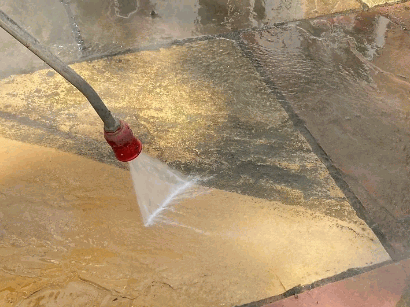
In addition to ensuring we use a lower setting, all of our power washer experts will use a wide-angle nozzle to clean Indian sandstone slabs. By relying on the wide-angle fan spray pattern, NW Wash's experts can avoid concentrating the stream of cold or warm water from the power washer in one place.
By distributing the stream of water in such a way, we can clean Indian sandstone without using such high pressure. This dramatically reduces the risk of damage to the Indian sandstone slabs.
When using a power washer on the stone's surface, it is really important to hold the pressure washer between 12 and 18 inches away from the stone's surface.
This is the only way to safely use a pressure washer when cleaning Indian sandstone paving. Holding it too close to the stone will clean Indian sandstone and damage the stone. Holding the pressure washer too far away may not remove the surface debris well enough, it may just about remove the loose dirt.
It's crucial when cleaning any surface for the first time that a patch test is done. NW Wash always ensures that a full test patch is completed before our team sets out to clean Indian sandstone paving.
This patch test must be done on an inconspicuous area. It allows us to test the pressure of the pressure washer and ensure that the jet washer will not permanently discolour or damage the Indian sandstone paving.
Using the pressure washer right is the most crucial part of cleaning Indian sandstone. Holding it in the wrong position can stop it from removing loose dirt and cause it to damage the Indian sandstone permanently.
When cleaning Indian sandstone, the jet washer must be held at a 45-degree angle. This prevents the water from hitting the stone directly, minimising the risk of damage. It doesn't prevent the jet washer from being an effective method and cleaning solution, but does wonders to keep the natural stone safe.
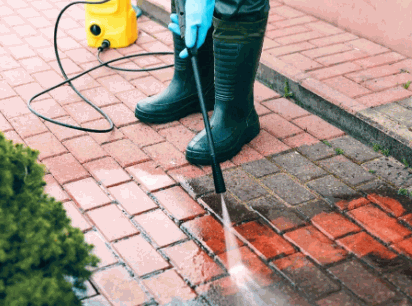
In some situations, it is necessary to use a mild detergent alongside the jet stream. When it comes to natural stone, however, you have to be really careful. Using household bleach or a bleach mixture can be incredibly damaging to natural stone if used wrong or too strong a mixture is created. Harsh chemicals like a poorly created bleach solution could damage and stain the warm colours of the sandstone, even if used at low pressure.
Sodium hypochlorite and other mild detergents can be used to clean Indian sandstone slabs so long as the manufacturer's instructions are followed exactly. And, as mentioned above, a patch test is essential.
With the help of a cleaning solution, cleaning Indian sandstone slabs can be a much easier job. In some situations, using cleaning solutions can replace the need for elbow grease and a stiff brush. It can even help with moss removal and green algae growth, and, in some situations, a thorough cleaning can help prevent weed growth.
It's illegal in the UK to dump wastewater in storm drains. It is also bad for the environment to dump any water with detergent in it. So be aware that if you use detergent when cleaning, you may have to be careful with your wastewater.
Pressure washing is not the only way to clean Indian sandstone slabs. It is the most effective and often the quickest, but it is not always suitable. For stubborn stains or natural stones that have been damaged, another cleaning process might be required.
You can try to use soapy water and a soft brush instead. This cleaning method is a popular technique among many, especially in between high-pressure washing. It is a great tool to help remove dirt caused by the great British weather in between deep cleans. With the help of a quality sealant, hose washing can work as great regular maintenance when you can't do jet washing on a regular basis.
Take a look: Will Pressure Washing Remove Paint From Brick

Using a soft brush, remove debris from the stone's surface. Avoid using a stiff broom for this as it could scratch the surface. If you must use a stiff brush, do so carefully.
You will then need to dilute any cleaning solution you're using. There will usually be instructions. You may need to use warm water or just clean water - always read the manufacturer's guidelines.
Once you have chosen your cleaning solution, you need to test a small area of your patio. This is especially important if you're using an equal parts bleach solution, but regardless of whether you're using soapy water, washing up liquid, or a specially designed detergent, a patch test is required.
Before you start cleaning, you should then remove any plant pots and garden furniture from your patio before you begin. You may be using less pressure to clean than if you had a jet washer, but the chemicals may still damage the items. They may also get in the way.
Scrub and rinse the Indian sandstone until all the dirt, algae, moss, and whatever else is gone from the surface. Follow instructions on the cleaning bottle to do this.
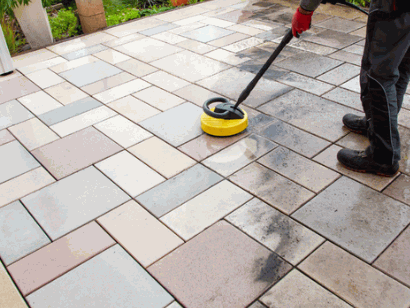
Repeat the process if necessary. If you can't tackle the stubborn marks, it may mean that you need to pressure wash the patio. Hire professionals like the team at NW Wash to help with this.
Learn more: What Is Industrial Floor Cleaning
Even if you clean Indian sandstone slabs with less pressure, you should be careful. Even clean water and soapy water, if used incorrectly on Indian sandstone, can cause damage. It can encourage algae and moss to grow, and algae can leave permanent discoloration.
That's why it's always advisable to hire professionals like NW Wash to get that perfect eye-catching finish. We can prevent uneven cleaning, and damage, and do so without relying on all the bleach-based products!
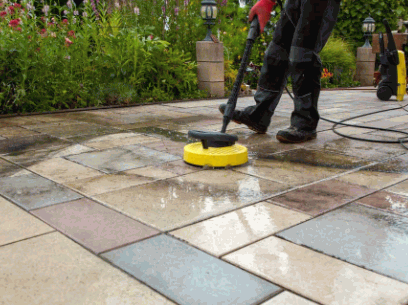
If your patio needs cleaning and you're worried about damaging it by doing it yourself, then contact the team of experts at NW Wash today for a free, no-obligation quote.
Too often people figure that they can leave their driveway alone. After all, it's designed to be outside, right? They figure that the rain can wash any dirt away, so there is no need to do anything more. This dramatically limits the lifespan of their driveways.
That's why at NW Wash, we offer top-quality pressure washing services. We can pressure wash a concrete driveway, stone driveways, and anywhere in between.
If you're wondering why you should even bother power washing your driveway, here are just some of the benefits that routine pressure washing your driveway can have.
Once you decide you're ready to explore our pressure washing services, contact us to discuss all of your pressure washing needs! We'll do all we can to pressure wash your driveway back to brand new.

By hiring professionals and pressure washing concrete driveways on a regular basis you can actually increase the property value of your home or business. NW Wash's experts can take your driveway and make it into something worth listing on your property's description! Something as simple as fixing a dirty driveway can dramatically improve the appearance of your home, which, in turn, can boost what is known as the property's 'curb appeal'.
This basically describes the property's attractiveness to passers-by. A home with a shining driveway and well-trimmed garden is much more likely to catch people's eyes than one with a driveway covered in grime or dirt.
Pressure washing removes grease stains, removes rust stains, and can even handle organic matter, taking a truly messy driveway and making it look as if it were freshly laid. By allowing us to clean the concrete surface of your driveway with our pressure washers, you can boost the sale value of your property and even the rental value if you are washing your driveway regularly enough!
Gain insights: How Much Does Driveway Pressure Washing Cost
Another benefit of hiring NW Wash is that by using the power washer on your driveway we can impede weed growth. Weeds are unsightly and can cause permanent damage to paving slabs if left untouched.
By using a pressure washer on your driveway, NW Wash can stop the growth of weeds. The water from the power washer gets into cracks and crevices, disturbing the growth of the weeds in places where you and your garden hose can't reach.
With the help of biocides, pressure washing can all but kill weeds completely, not only improving the appearance of your driveway but limiting how much work you have to do to maintain it.

In addition to killing weeds, pressure washing your driveway on a regular basis can help to remove hazards like mould and algae, both of which are bad for your health.
Trained professionals like the team at NW Wash can completely remove organic growth and we can even work to preserve your beautiful driveway by applying driveway sealants. A sealant can prevent moisture from getting into the cracks and holes in your driveway, and, as a result, prevents the growth of things like mould and algae.
This issue is a year-round problem that can cause slipping hazards and, if left untouched, can develop into a real safety hazard that not only ruins a beautiful driveway but can pose a risk to you and your family.

At NW Wash we understand that driveways are prone to all sorts of marks, stains, dirt, and grime. In particular, many driveways suffer from oil stains and grease stains. These can prove incredibly difficult to budge, especially if you try to clean them with just water from a garden hose or a hard-bristled brush.
Pressure washing, though, can remove grease stains and deep clean your driveway almost effortlessly. Our pressure washers can reach every corner of your driveway, cleaning the entire surface carefully.
Our team of pressure washing experts at NW Wash can remove all sorts of dirt and grime build-up from your driveway surface, and the majority of the time, they can do so using only high-pressure water.
This removes unsightly stains and prevents you from having to deal with a slippery driveway. This is especially important for businesses that may have to handle liability if someone were to slip and hurt themselves on a slippery driveway.
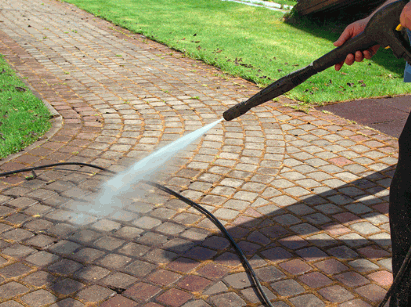
In addition to all of the above, it is important to note that using a pressure washer is, without a doubt, the most efficient way to clean a driveway. The high-pressure water stream created by a pressure washer blasts all dirt away quickly and easily, in ways that a garden hose could not manage.
Most people's go-to method when it comes to cleaning their driveways at home is either the hose or buckets of water, detergent, and a brush. This is fine for a surface clean, but it will not tackle half the dirt and grime that a pressure washer will. It is the only cleaning method that removes mold, mildew, grime, and other debris from the surface.
Not only is efficient and better than all the other methods, but it is also the most environmentally friendly technique. Where you might rely on detergents, NW Wash and our professional pressure washing team use just water, raising no dangerous runoff into the bushes or the plants.
Uncover more: How To Pressure Wash A Driveway

Pressure washing is also the only real way to really make sure that your driveway lasts as long as it should. By getting the pressure washer out on your concrete driveway, paving slabs, patio slabs, or natural stone, NW Wash can help prolong the lifespan of your driveway.
Regular driveway pressure washing can prevent permanent damage by removing debris, organic growth, and slippery substances. It is the only way to not only ensure that your driveway looks great long-term, but that it's in good condition, too.
Ants and other pests or critters are real annoyances that nobody wants in and around their home. At NW Wash, we know just how important this is, especially for businesses or for homes with children and pets.
That's why we offer top-quality power washing and pressure washing services to help remove any debris from the surface of the driveway. By removing food and items that may be used as shelter by pests and critters, it is possible to reduce the risk of pests.
Generally speaking, clear surfaces are always better, and with a proper power wash, we can provide just that.

Keeping your driveway clean is paramount for protecting your vehicles, too. Tires and the undersides of vehicles are fragile, and debris, slippery substances, and all sorts of other materials that can appear on driveways can cause damage if left alone.
Alternatively, a clean driveway will help to prolong the life of your cars and bikes as well as all of the above!

If any of the above sounds good to you, reach out to us today for a free no-obligation quote!
Whether you've got a concrete or brick driveway, power washing or pressure washing is the best and most efficient way to get it clean, and keeping your driveway clean is essential when it comes to maintaining and protecting the material and the surface it is made from.
Knowing exactly how much pressure washing your driveway will cost, though, isn't easy. There are several factors that can impact the driveway cleaning cost, so budgeting for a pressure washing job can be tough.
If you're trying to figure out how much it'll cost to have your driveway professionally cleaned, here's what you need to know about driveway cleaning prices and pressure washing prices.

Driveway cleaning is a very individual task with lots of important factors to consider. As a result, professional driveway cleaners will base their quote and costs on your exact driveway to ensure that they're charging enough.
Our expert team at NW Wash will take all the information we need to calculate a quote for your driveway cleaning job. This will take into consideration all of the following factors, as well as stubborn stains, grease, and anything else worth noting.
Check out: Why Pressure Wash Your Driveway

One of the most important factors when it comes to determining what you should expect to pay for driveway cleaning is the size of the driveway.
A small driveway, for obvious reasons, will usually take significantly less time and resources to clean than a large driveway or even a medium-sized driveway. The labour costs are therefore higher when it comes to larger driveways, as most pressure-washing companies will charge per square metre.
If there are lots of oil stains or surface grease, this may then further influence the cost, regardless of whether you have a large driveway or a small driveway.
Another important factor that NW Wash will take into consideration when providing a quote for your driveway cleaning is the condition of your driveway.
If you have avoided a professional driveway cleaning for too long, and have maybe tried to pressure wash the driveway yourself, there's a chance that using the wrong nozzle or detergent may have caused broken patio slabs, loose features, or extensive driveway damage. Or perhaps you've moved into a property that has not been taken care of, or there was an accident - whatever the cause, a damaged driveway will require more care.
In order to ensure no further damage is caused, a damaged driveway will require a softer touch. Professional driveway cleaning providers like NW Wash will always allow for this when determining the cost of pressure washing.
Where in the country you and your driveway are will also impact how hard it is to pressure wash your driveway. Even the direction of your driveway can change the cost.
North-facing driveways are more prone to dampness and moisture, and as a result, they often grow more algae and lichen. These can be harder to remove and often require specialist cleaning solutions.
North-facing driveways and those in damp, seaside areas are also more likely to develop stubborn stains, and this has to be considered when it comes to the cost of your driveway cleaning.
Our experts at NW Wash will also ask what type of driveway you have. This will allow us to determine things like the strength of the water we can use when we're power washing, the detergents that are and are not safe to use, and even what sealants can be used. All of which are instrumental in determining the driveway cleaning cost.
You may have a block paving driveway, a natural stone driveway, or perhaps a concrete or brick driveway. Whichever you have, make sure you let NW Wash know when you call to arrange your free, no-obligation quote.
Whatever type of driveway you have, whether it's a concrete driveway or a brick one, NW Wash will provide you with a full quote before we come and get your driveway clean with our brilliant pressure washers.
While the power washing cost will depend on the factors above, it is always worth considering the national average. It should help you to determine a rough budget to consider.
But for a full quote, contact NW Wash today. One of our experts will take you through the whole cleaning process and provide an in-depth driveway cleaning cost guide, even down to the additional costs.
So how much does it cost, on average, to pressure wash a driveway?
For a small driveway, you can expect to pay around £200, and the process will take around 4 to 5 hours.
Bare in mind that this is based on a small driveway without tough stains, too much organic growth, or anything else.

For a medium-sized driveway, expect to pay roughly £300. The process should take 6 to 7 hours.

Larger driveways can cost as much as £400 and take anywhere between 7 and 9 hours to pressure wash.
Again, bare in mind that these costs do not include handling any tougher stains or excessive surface grease.
Discover: How To Pressure Wash A Driveway

In addition to the use of high-pressure water on your driveway, you can choose to pay for additional extras. Power washing your driveway is great, but you can help to keep your driveway clean using driveway sealants, or you could clean your driveway gate or garage door to make your home really sparkle.
Driveway sealants are a great way to limit how often you have to use a pressure washer on your driveway. There are a number of driveway sealants out there, some designed to keep your driveway free from organic material, some designed to combat oil and grease.
These can limit the amount of oil stain removal you have to do, and can make driveway cleaning a much easier task that you have to do much less often, ultimately allowing you to save money!
A driveway sealant in addition to regular use of a pressure washer and frequent power washing will transform your driveway and home.

Biocides are a great tool for driveways that suffer from organic growth. They can be used when cleaning with a pressure washer to help remove biological matter and prevent its regrowth. It can be used in place of a typical detergent and provide perfect results.
If your driveway is sparkling but your driveway gate is still looking worse for wear, then you might choose to clean your driveway gates, too. This is an additional cost, however.

Just like cleaning your driveway gate, you may also choose to hire a pressure washer to power wash your garage door. If you do hope to get your garage door cleaned, you can of course expect to pay additional fees.

So what does pressure washing a driveway entail? What is covered in the driveway cleaning cost?
With the right experts like ours at NW Wash, a driveway cleaning job will be done within a day. Unless there are additional tasks or it is an extensive driveway, it should only take a few hours to get your driveway clean.
At NW Wash we provide high-quality driveway cleaning services at affordable prices. Using a pressure washer, we offer power washing and jet washing services.
Once you have spoken to us about having your driveway cleaned and we have discussed driveway cleaning prices, we will send our expert team out to your property.
Using a pressure washer on a driveway is a delicate job and must only be done by professionals who know how to get a driveway cleaned. Done incorrectly, choosing to pressure wash a driveway can lead to damage. Our team of experts at NW Wash are all trained to carefully use pressure washers to effortlessly remove tough stains and build-up of dirt, surface grease, and oil to reveal a stunning driveway.
We will need a water supply, but other than that you do not have to worry about moving anything or pre-treating your driveway before we arrive to power wash.
Then, with your driveway cleaned, our team can provide expert advice on how to limit your driveway cleaning costs going forward by taking the best care of your exterior surfaces as possible.

Contact us today to find out how our personalised driveway cleaning service can help you. Tell us all about your driveway and we will tell you how much it'll cost to clean a driveway with a jet washer!
Your driveway will be pressure washed in no time at all, leaving you with sparkling paving slabs and no more oil stains!



